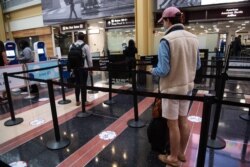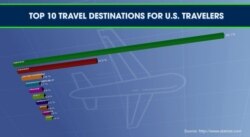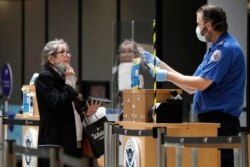Traveling abroad used to be relatively easy. Pick a country, get your visa if needed, book airline and/or hotel reservations, and you are ready to go. But as countries slowly emerge from the coronavirus pandemic lockdowns and reopen for visitors, travel industry experts say leisure travel is going to be the slowest to return, and it's going to be a different experience — especially with various restrictions still in effect.
Dr. Jan Jones, program coordinator for hospitality and tourism management at the University of New Haven College of Business says it's going to take time to get used to the new normal.
"I do think people want to travel, and they're watching very closely the destinations that they want to go back to and keeping an eye on exactly what's opening up and how it's opening up. But I think it's going to be tough in terms of international travel in the beginning," Jones told VOA.
With over five million coronavirus cases and 335,000 deaths worldwide, the U.S. State Department still has a level 4 global health advisory urging Americans "not to travel."
A new normal
And even if travel picks up again, it will be a different experience, said Peter Cerda, International Air Transport Association regional vice president for the Americas.
"We're accustomed to seeing over 200,000 flights go into the air every day in such a safe, efficient manner with various levels of comfort. But that's going to be different, unfortunately, at least for the near future," he said. "Measures and different standards will have to be implemented to safeguard the well-being of the travelers and ensure that aviation is not a vector of the pandemic being spread to others."
Cerda said a combination of efforts to reduce risk of contagion is needed, including temperature screening, physical distancing, the use of face coverings, simplified cabin service and enhanced cleaning procedures.
"We believe that the multilayered coordinated approach is going to be one that will bring confidence back," he said. "But it's also going to put a lot more responsibility on the traveler. He's going to have to do a lot more legwork before he even gets to the airport. He's going to have to check for his flight before, he's going to have to look at printing his boarding card before, his baggage tag, and also making sure that he's fit to travel. And that will depend on the compliance that the governments around the world will require of the traveler."
Physical distancing could increase airfares if airlines were restricted to selling fewer tickets in order to keep some seats empty, Dubai Airports CEO Paul Griffiths said recently. "It costs pretty much the same to operate an airplane whether it's completely full or a third full. And so to provide the same level of revenue to cover the cost of operating, airfares would have to be something like three times what they are today," Griffiths said, adding that he hoped measures would only be short term.
According to the latest data from 2017, the top 10 destinations for Americans include Mexico, Canada, Britain, Dominican Republic, France, Italy, Germany, Spain, Jamaica and China.
Quarantines at arrival
But most of these countries have restrictions now, including prohibiting tourists or requiring quarantines at arrival.
Gloria Guevara, CEO of World Travel Tourism Council, said in the case of the U.K., for example, "currently we have a two-week quarantine, which is unfortunate. And that means that if you arrive, you have to spend 14 days in quarantine, which in our mind doesn't make any sense and has perhaps been successful at the beginning of the lockdown. But based on the experience and what we have seen in other countries, it seems that it makes more sense to perform testing."
Jan Jones echoes Guevara, saying that "typically the trips, even for U.S. market, are not as long. Europeans typically will travel for longer periods of time. Americans typically don't do that. So it's going to be really interesting to see what happens. But I think very constraining on the industry itself."
Quarantines will affect travel, and even more travel agencies, said Kibret Woldearegay, owner of Fana Travel in Virginia. He says sometimes people travel for a week or 10 days, and no one will be willing to go anywhere if they know they will be subjected to a 14-day quarantine.
"Our business is down like 98%, 99%. I would say 100 percent for the past three months. There is just nothing," he said. "They [people] are not calling. Those who are calling want a refund for their money for a ticket they bought a long time ago."
Refunding tickets also affects income he and other employees have made on commission months ago.
"We work on commission," he explained. "Whenever we refund, the airline will ask us to recall the commission or the tickets. So technically we're losing every single day, and we're not making any money to cover that cost."
Lessons learned
It is unclear when global travel will recover from the pandemic that has shattered demand, and it will partially depend on countries lifting their lockdowns. But it's crucial to do that in a coordinated approach between governments and the private sector, Guevara said. She also said it's important to learn from past health crises.
"For instance, in the case of Ebola, MERS and SARS outbreaks, there was not a vaccine. And we were able to travel, right?" she said.
How to prepare for trips
For those who plan to travel in the near future, along with State Department and CDC guidelines, an interactive map on the IATA website shows the various rules and restrictions of individual countries.












